The world’s most powerful state surveillance agencies have formed intelligence-sharing alliances known as the 5 eyes, 9 eyes, and 14 eyes alliances, and their purpose is to monitor and share the online activity of internet users to protect national security.
But what you might not know is that if the VPN service you use, its jurisdiction could be subject to the Five Eyes, Nine Eyes, and Fourteen Eyes Alliance intrusive surveillance, data retention, or data-sharing laws. Learn more about what all this means for your online privacy in this guide.
What is the Five Eyes Alliance
The Five Eyes intelligence sharing alliances are a group of five countries – Australia, Canada, New Zealand, the United Kingdom, and the United States – that share intelligence information with one another.
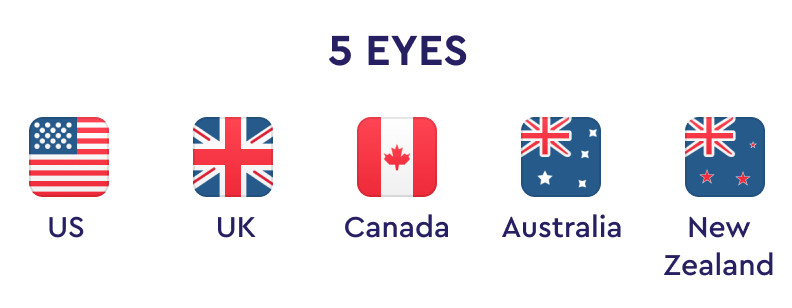
This alliance traces its roots back to the UKUSA Agreement of 1946, which was signed by the United States and the United Kingdom during the Cold War.
The agreement established a partnership for signal intelligence between the two countries, which later expanded to include other countries such as Canada, Australia, and New Zealand under the BRUSA Agreement.
The Atlantic Charter, signed by the United States and the United Kingdom in 1941, laid the foundation for the alliance and included a commitment to cooperation in the areas of intelligence sharing and security.
Beginning with what it is, the Five Eyes Alliance (FVEY) was born out of a Cold War-era intelligence pact called the UKUSA Agreement.
- United States
- United Kingdom
- Canada
- Australia
- New Zealand
History
Opposed to what people tend to think about it now, the Five Eyes Alliance was actually an intelligence-sharing agreement between the United States and the United Kingdom during the Cold War.
Why did they need to have an intelligence-sharing agreement with each other, you ask?
They were trying to decrypt the Soviet Union Russian intelligence, and this (along with the other Eyes Alliances) was eventually BORN.
In the name of spying on foreign governments, the agreement eventually grew to be a basis of electronic spy stations worldwide.
(Not so fun fact: It became the foundation of partnerships between intelligence agencies! Such an example would be the Signals Intelligence (SIGINT) agreements in the West!)
Yes, that includes agreements on ALL the data via telephone calls, faxes, and computers.
Including the data of yours and mine? Maybe it’s time we find out for ourselves…
5-Eyes Members
| 5 Eyes Alliance | 9 Eyes (includes 5 Eyes) | 14 Eyes (includes 9 Eyes) |
|---|---|---|
| ⭐ United States | United States | United States |
| ⭐ United Kingdom | United Kingdom | United Kingdom |
| ⭐ Canada | Canada | Canada |
| ⭐ Australia | Australia | Australia |
| ⭐ New Zealand | New Zealand | New Zealand |
| Denmark | Denmark | |
| France | France | |
| The Netherlands | The Netherlands | |
| Norway | Norway | |
| Belgium | ||
| Germany | ||
| Italy | ||
| Spain | ||
| Sweden |
In the late 1950s, a few more countries eventually joined. The following of these Five Eyes (FVEY) countries are Canada, Australia, and New Zealand.
Partnered with the original United States (US) and United Kingdom (UK), we have the entire list of the Five Eyes Countries!
As time went on, the bonds and agreements between these five countries only got STRONGER with each other.
Documents
This arrangement between the Five Eyes countries remained top secret for an indefinite period!
However, it was only a matter of time (2003 to be exact) before the National Security Agency (NSA) finally discovered the Five Eyes intelligence agency.
Fun fact: 10 years later, Edward Snowden leaked some DOCUMENTS as an NSA contractor.
What type of information did the NSA have on them?
Edward Snowden of the NSA revealed government surveillance data of citizens’ and internet users’ online activity.
And don’t forget about the information of the NSA on how the intelligence-sharing network was SO MUCH BIGGER than what everyone thought.
What is the Nine Eyes Alliance
Then, we have the Nine Eyes Alliance.
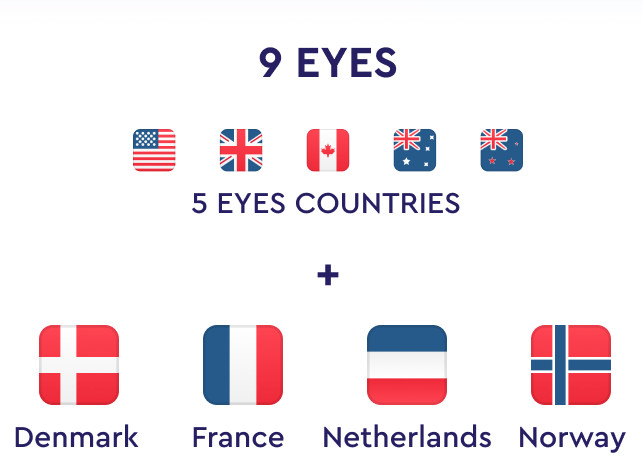
It is a group of nations that share intelligence with each other. Nine Eyes is similar to the former alliances because it can now pass for a surveillance system.
- 5-Eyes states +
- Denmark
- France
- Netherlands
- Norway
9-Eyes Members
| 5 Eyes Alliance | 9 Eyes (includes 5 Eyes) | 14 Eyes (includes 9 Eyes) |
|---|---|---|
| United States | ⭐ United States | United States |
| United Kingdom | ⭐ United Kingdom | United Kingdom |
| Canada | ⭐ Canada | Canada |
| Australia | ⭐ Australia | Australia |
| New Zealand | ⭐ New Zealand | New Zealand |
| ⭐ Denmark | Denmark | |
| ⭐ France | France | |
| ⭐ The Netherlands | The Netherlands | |
| ⭐ Norway | Norway | |
| Belgium | ||
| Germany | ||
| Italy | ||
| Spain | ||
| Sweden |
Again composed of the original Five Eyes member countries, the Nine Eyes also includes Denmark, France, the Netherlands, and Norway as third parties.
Since that makes up all of the Eyes Alliances and agreements, does this mean that all of them have access to the data? Sure it does.
Purpose
While its current purpose doesn’t seem to have gone through media leaks yet, it does seem that this mass surveillance alliance looks more of an EXCLUSIVE club of SSEUR.
It’s not backed down by any treaties and is currently just known as an arrangement between the SIGINT intelligence agencies.
What is the Fourteen Eyes Alliance
Existing in different forms of information alliances since 1982, the Fourteen Eyes alliance is the intelligence group consisting of the 5 Eyes countries and some new members.
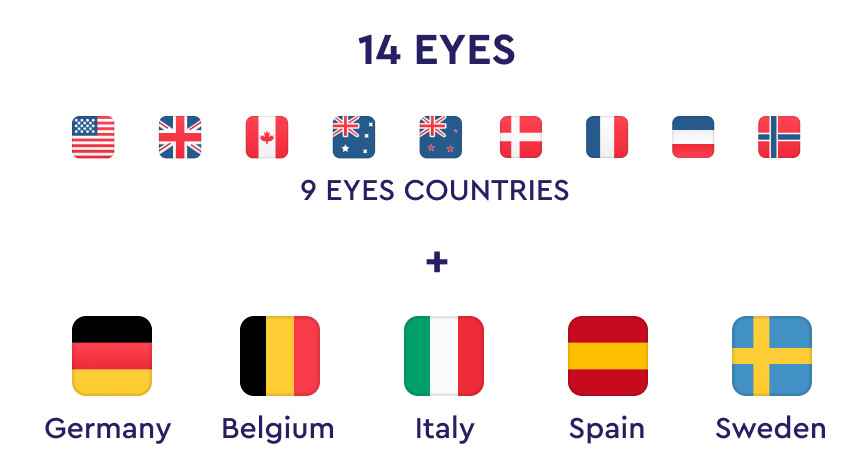
For your information, the Fourteen Eyes alliance isn’t really its name. Its official title is the SIGINT (Signals Intelligence) Seniors of Europe (SSEUR)!
- 9-Eyes states +
- Belgium
- Germany
- Italy
- Spain
- Sweden
14-Eyes Members
| 5 Eyes Alliance | 9 Eyes (includes 5 Eyes) | 14 Eyes (includes 9 Eyes) |
|---|---|---|
| United States | United States | ⭐ United States |
| United Kingdom | United Kingdom | ⭐ United Kingdom |
| Canada | Canada | ⭐ Canada |
| Australia | Australia | ⭐ Australia |
| New Zealand | New Zealand | ⭐ New Zealand |
| Denmark | ⭐ Denmark | |
| France | ⭐ France | |
| The Netherlands | ⭐ The Netherlands | |
| Norway | ⭐ Norway | |
| ⭐ Belgium | ||
| ⭐ Germany | ||
| ⭐ Italy | ||
| ⭐ Spain | ||
| ⭐ Sweden |
The Fourteen Eyes member Countries are the following: the Five Eyes (5 eyes) countries, Belgium, Denmark, France, Germany, Italy, the Netherlands, Norway, Spain, and Sweden.
Together, the rest of the countries participate in SIGINT sharing as third parties.
Purpose
Like the Five Eyes, its initial mission was to retrieve data about the USSR on the Soviet Union. But one thing to note about the Fourteen Eyes alliance is it’s not actually a formal treaty.
Think of it as an AGREEMENT made between the SIGINT agencies.
A SIGINT Seniors Meeting is held between the heads of the Signals Intelligence sharing agencies, which include the NSA, GCHQ, BND, the French DGSE, and more!
As you can expect, this is where they share intelligence and surveillance data.
Does that make it sound better in terms of their information surveillance on internet activity?
Again, you tell me.
The Third-Party Contributors
However, these countries are not the only ones involved in intelligence sharing.
In addition to the Five Eyes alliance, there are other intelligence alliances and agreements between countries such as Denmark, France, the Netherlands, Italy, Spain, and Sweden.
While the specifics of these agreements and alliances may vary, they all involve some level of cooperation and sharing of intelligence data between member countries.
It’s important to keep in mind that while these intelligence networks can play an important role in national security and counterterrorism efforts, they can also raise concerns about privacy and human rights.
Besides the above-listed countries, there are also third-party contributors which are countries belonging to the North Atlantic Treaty Organization (NATO)
Countries including Greece, Portugal, Hungary, Romania, Iceland the Baltic States, and many other European countries), as well as other “strategic” intelligence-sharing allies which include Israel, Singapore, South Korea, and Japan.
I think it might be worth noting that other parties are suspected of exchanging information with the huge data surveillance system.
As you can see, they’re also well-known by the world as owners of MULTITUDES of data!
How Do These Alliances Affect VPN Users
The Five Eyes intelligence-sharing alliances have a significant impact on the VPN industry, particularly in terms of user privacy.
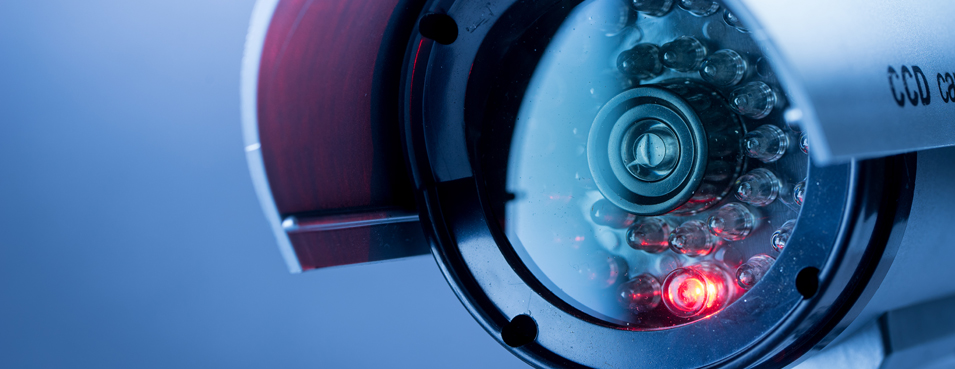
The intelligence community, including code breakers, human intelligence, signal intelligence, and computer network exploitation, are constantly on the lookout for information that can aid their activities.
This means that if you use a VPN located in one of the Five Eyes countries, your online activity and intelligence data could potentially be accessed by security services.
As a result, it’s essential to choose a VPN that has a no-logs policy, as this can help protect your data and ensure your privacy.
I’m sure you’re aware of these data mass surveillance systems. So what do I propose to do with the said countries?
The aim of this article is to teach you about the implications of these intelligence agencies, of course!
Online Laws and Regulations
Whoever holds jurisdiction over the user data of citizens, especially when internet users are on a VPN service, depends on a lot of factors.
It could be the citizens’ physical location, server location, or location of the VPN providers.
All of it.
If citizens want to be safe, it’d be in their best interest to know about the laws of ALL THREE FACTORS of user data mass surveillance.
Privacy Laws of the Country You Live In
One of the first things you should know about the regulations in your country IS whether VPN is even ALLOWED.
Most of the time, countries do allow the use of such private internet access services. However, this isn’t always the case!
You should also know about the data protection privacy laws present in your country. How protected is your data under your country’s law enforcement?
While I believe the alliances won’t simply state that they’re taking away their data, it’s still good to know!!
Privacy Laws of the VPN Provider Countries
Another important consideration you should know about is the law enforcement of the surveillance laws in the business country.
Depending on the country, the provider could actually be asked to SEND information and user data of the citizens it manages.
Most especially because agreements between the intelligence agencies and Eyes alliances allow easy breaching of information about the citizens’ privacy.
If anything, I advise you NOT to choose a VPN provider based in a country associated with the Fourteen Eyes Alliance!
Privacy Laws of VPN Country Server
Apart from the VPN providers’ location, I advise that it’s also worth being knowledgeable about the countries’ privacy laws where your server is located!
You might need these because different places in the world have different ways of keeping their data safe. Or not.
No Logs Policies
I know that VPNs are easily under the jurisdictions of the Eyes countries, and that’s exactly why I’m telling you that the best VPNs are those with no-logs policies!
This means that the VPN WON’T BE RETAINING any information which could be used for mass surveillance of any sort.
Therefore, you as the user and your online activity won’t reach the intelligence-sharing agreements of the Eyes countries.
That’s right! Choosing the right VPN protects your privacy and your fellow citizens!
No Logs Policies: The Emblem of Privacy
Now I have a story for you!
A while back, a Turkish police investigation party got into a very specific mass surveillance case.
An Express VPN user among the authorities tried to ask the VPN provider to hand them the USER DATA and citizens’ information using the said service.
But because of the no logs policy of Express VPN, authorities were unable to find any relevant data and information!
I believe this is comforting, indeed. But citizens must also note that it’s not enough for a VPN provider to claim they have no logs policies.
The 5 Eyes Alliance, 9 Eyes, and 14 Eyes are so much smarter than that, so make sure to keep your eyes open because of that privacy agreement!
The Best VPNs for Countries Outside of the Five Eyes Alliance
Human rights and privacy laws are fundamental rights that should be respected and protected.
With the rise of the internet and tech companies, it’s become more important than ever to ensure that personal information is kept safe and secure.
No-logs policies are an essential tool for achieving this goal, as they prevent companies from storing or sharing user data without their consent.
Tech companies have a responsibility to prioritize human rights and privacy laws, and implementing no-logs policies is a critical step in doing so.
I know I’ve tackled trying to be aware of your surroundings as a VPN user, but it’s not enough to tell you what you SHOULD and SHOULD NOT do.
So here is my list of the best VPN outside the 5 eyes alliance!
1. NordVPN
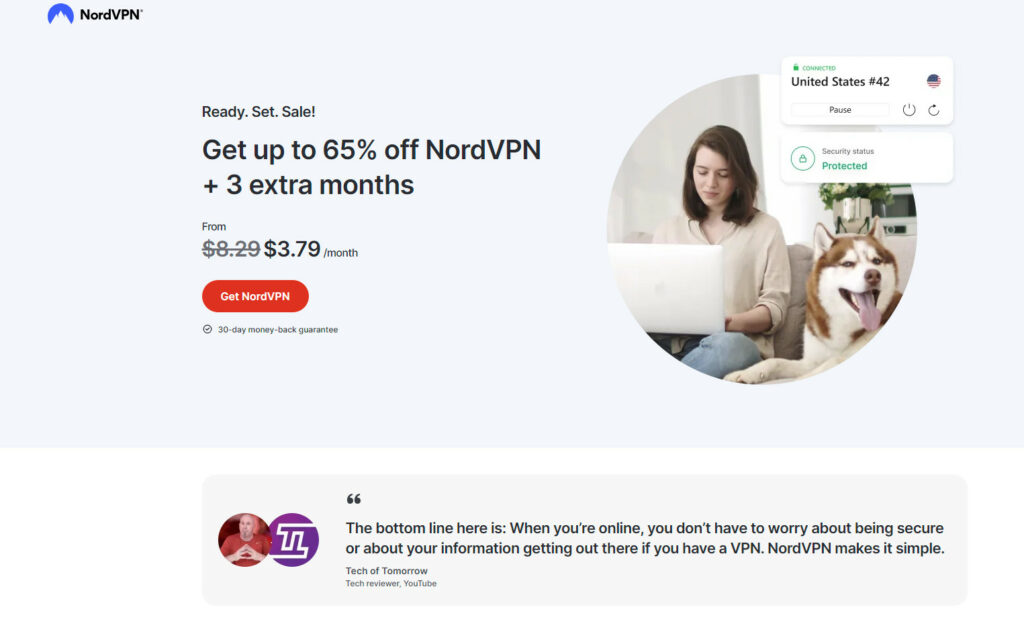
Secure your online privacy with NordVPN, the leading VPN service provider trusted by millions of users worldwide. With NordVPN, you can browse the internet with peace of mind knowing that your online activities are protected by military-grade encryption and cutting-edge security features.
Benefits:
- Stay secure and private online with top-notch encryption and security features
- Access geo-restricted content and websites from anywhere in the world
- Enjoy lightning-fast speeds with unlimited bandwidth and no data caps
- Protect all your devices with NordVPN’s easy-to-use apps for Windows, Mac, iOS, Android, and more
- Choose from over 5,500 servers in 59 countries for maximum connection options
Features:
- 256-bit AES encryption
- Double VPN and Onion Over VPN for ultimate privacy
- CyberSec technology blocks malicious websites and ads
- Automatic Kill Switch stops all internet traffic if the VPN connection drops
- Strict no-logs policy
- 24/7 customer support
- 30-day money-back guarantee for all plans.
Check out my review of NordVPN and learn how it can protect your online privacy and security!
2. Surfshark
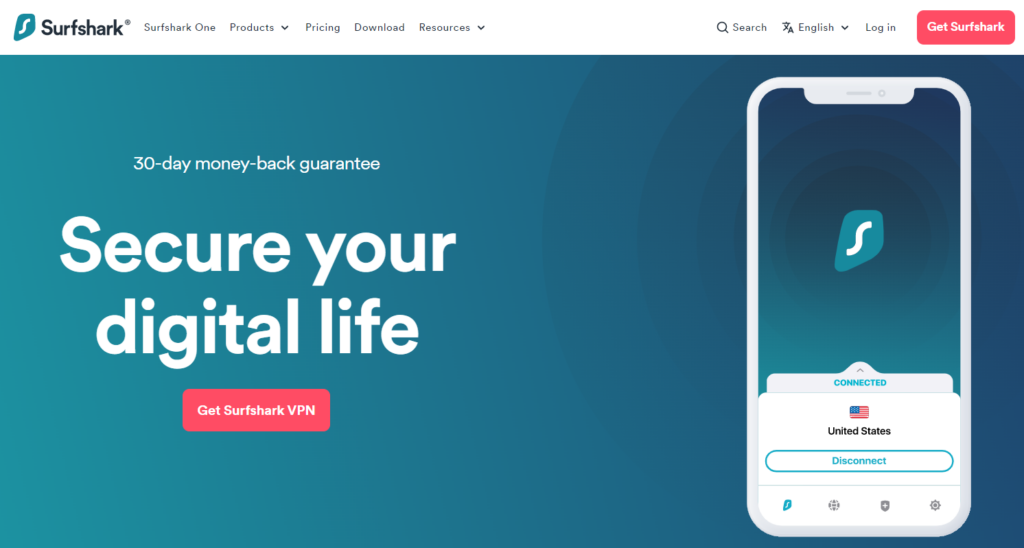
Dive into the online world securely with Surfshark, your robust VPN companion. With Surfshark, navigate the digital oceans without revealing your tracks, ensuring your online activities remain submerged from prying eyes.
Benefits:
- Stay shielded online with top-tier encryption and cutting-edge security protocols.
- Unlock a world of content, bypassing geo-blocks effortlessly.
- Experience swift connections with no restrictions on bandwidth or data.
- Guard all your devices using Surfshark’s intuitive apps, available for Windows, Mac, iOS, Android, and beyond.
- Connect through a vast network with more than 3,200 servers across 65 countries.
Features:
- Industry-standard 256-bit AES encryption.
- CleanWeb feature to block ads, trackers, and malicious websites.
- Strict no-logs policy ensuring your activities aren’t stored.
- Whitelister (split tunneling) to decide which apps bypass the VPN.
- MultiHop to connect via multiple countries simultaneously for enhanced privacy.
- 24/7 dedicated customer support.
- 30-day money-back guarantee for peace of mind.
Read more in my comprehensive Surfshark review and uncover why it stands tall among the top-tier VPN providers in today’s digital age.
3. ExpressVPN
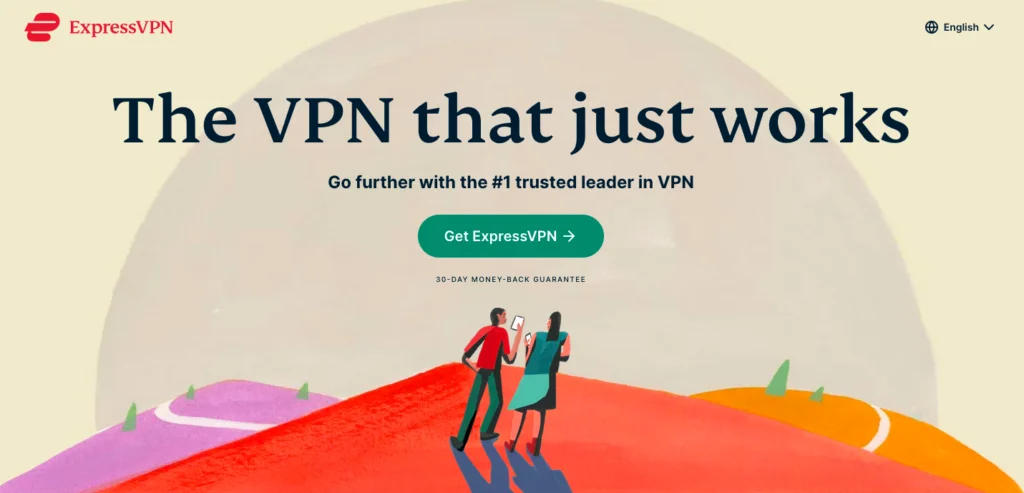
Protect your online privacy and security with ExpressVPN, the fastest and most reliable VPN service. With ExpressVPN, you can browse the internet without any restrictions, access any content from anywhere in the world, and stay safe from prying eyes.
Benefits:
- Stay secure and private online with military-grade encryption and advanced security features
- Access geo-restricted content and websites from anywhere in the world
- Enjoy lightning-fast speeds with unlimited bandwidth and no data caps
- Protect all your devices with ExpressVPN’s easy-to-use apps for Windows, Mac, iOS, Android, and more
- Choose from over 3,000 servers in 94 countries for maximum connection options
Features:
- 256-bit AES encryption
- TrustedServer technology for maximum security and privacy
- Automatic Kill Switch stops all internet traffic if the VPN connection drops
- Split Tunneling lets you choose which apps use the VPN and which don’t
- No activity or connection logs
- 24/7 customer support
- 30-day money-back guarantee for all plans.
Read my detailed ExpressVPN review and learn how to achieve the ultimate online freedom and security with this premium VPN service.
4. CyberGhost
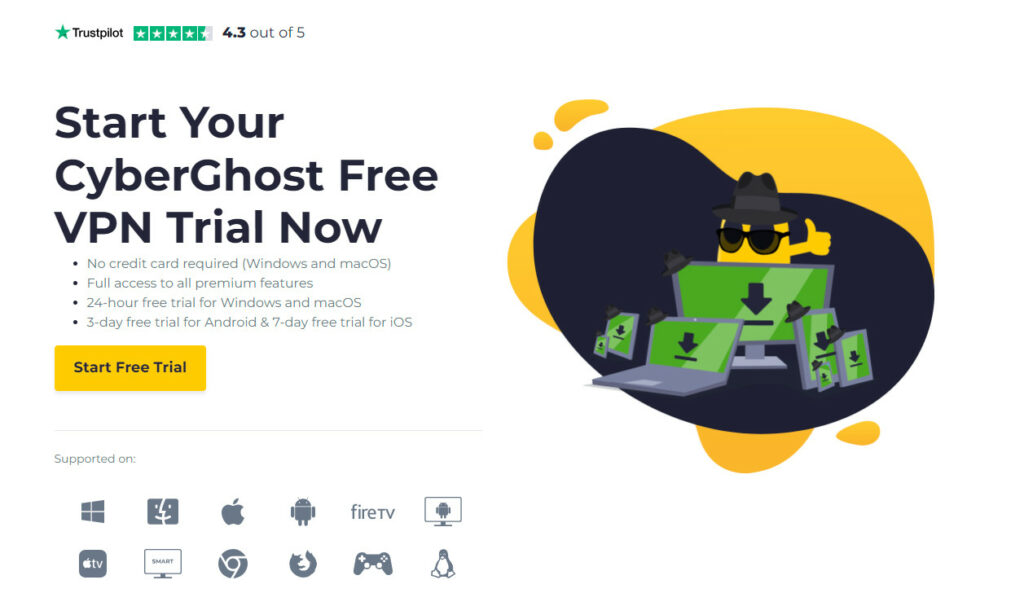
Stay secure and anonymous online with CyberGhost, the all-in-one VPN service. With CyberGhost, you can browse the web freely and access any content from anywhere in the world without compromising your privacy or security.
Benefits:
- Stay secure and private online with military-grade encryption and advanced security features
- Access geo-restricted content and websites from anywhere in the world
- Enjoy fast speeds with unlimited bandwidth and no data caps
- Protect all your devices with CyberGhost’s easy-to-use apps for Windows, Mac, iOS, Android, and more
- Choose from over 6,900 servers in 90 countries for maximum connection options
Features:
- 256-bit AES encryption
- Automatic Kill Switch stops all internet traffic if the VPN connection drops
- No-logs policy
- Ad and malware blocker
- Split Tunneling lets you choose which apps use the VPN and which don’t
- 24/7 customer support
- 45-day money-back guarantee for all plans.
Read my detailed CyberGhost review and find out why this VPN is one of the best on the market right now.
A Country-by-Country Guide
I’ve gone through the specifics of the actual VPN and the 5 eyes business now, and I believe you’re ready to learn more about the specifications of every country possible!
The more knowledge you have, the safer your privacy will be.
Australia
Beginning with the star of the article, it’s true that Australia doesn’t have any restrictions on internet use and access. And VPNs are legal here, too!
But the things I want you to take out of this section is that Australia is a member of the five eyes, the nine eyes, and the fourteen eyes countries. Yes, it’s one of the core countries of the 5 Eyes Alliance.
Australia also REQUIRES their telecommunication companies to store user data for 2 years. In fact, there have been cases of Australian law enforcement accessing such information!
I can’t say that your privacy will be ensured the moment it gets to the eyes of Australia because it participates in the intelligence-sharing agreements.
The British Virgin Islands
Even if the British Virgin Islands fall on the territory of the United Kingdom (UK), it is self-governed and has its own laws and legislature.
Such laws include its non-involvement in the intelligence-sharing agreement, despite the UK being a core member of the 5 Eyes.
In fact, the British Virgin Islands is the home of Express VPN, which is one of the most private VPNs you could get for yourself!
Telecommunication providers in the British Virgin Islands also aren’t subjected to data retention laws and government surveillance of the UK.
5 Eyes? Don’t count the British Virgin Islands!
Canada
While I wish we could, we can’t avoid the core members of the 5 eyes in this list!
VPNs are legal in Canada, but this country also happens to be one of the core countries of the 5 Eyes Alliance, the 9 Eyes, and the 14 Eyes.
They have strong protection laws for freedom of speech and press, and their government also strongly supports network neutrality. Among all these, Canada also provides an initiative for universal internet access to all of its citizens, and they keep it ALL unrestricted.
While I have to admit these are all great, one can’t just ignore their participation in the 5 Eyes. Any data that goes through or is stored in Canada? Safe to say, it’s at risk of being part of the intelligence-sharing agreement.
Popular VPNs based in Canada include Betternet, BTGuard VPN, SurfEasy, WindScribe, and TunnelBear!
China
Known as the world’s worst abuser of internet freedom, China’s restrictions on internet activity continue to tighten thanks to its strict cybersecurity laws.
But more than its heavy censorship, China also requires its citizens to use data localization and real-name registration for internet providers.
Any time the government requests documents, the telecommunication companies have to HAND THEM OVER.
Regardless of the principles of privacy.
VPNs? The only ones allowed are those which are government-approved.
Did I mention that internet users who try to access international internet networks without the government’s approval are subject to fines?
Hong Kong
Following the discussion on China, Hong Kong actually doesn’t follow these restrictive guidelines. After all, they can govern on their own.
This leaves Hong Kong with almost unlimited internet access, with just a few restrictions on illegal content (piracy and pornography, for example)!
But VPNs ARE legal again!.
A few of the most popular VPNs in Hong Kong are DotVPN, BlackVPN, and PureVPN!
Israel
Moving back to a country involved with the Eyes Alliances, there’s Israel!
To start, Israel covers strong legal protection policies on freedom of speech, including such a right on the internet. Censoring online content? Israel hasn’t been known for such a thing.
But Israel IS known to be one of the third-party contributors of the Eyes Alliances (although it’s not officially a member).
There have been a few cases of Israel working closely with the United States (US) on surveillance initiatives, for example. Which I believe you should still take note of.
Due to Israel having even greater powers than the NSA, this is a great benefit to the United States (one of the core countries of the 5 Eyes Alliance).
And before I forget, yes, VPNs are legal in Israel!
Italy
As a member of the 14 Eyes Alliance, there have been a few cases of Italy being involved in the stocking of data.
If anything, the telecommunication companies in Italy are actually REQUIRED to keep online data for up to 6 YEARS!
Italy does, however, protect the freedom of expression of the people, and citizens can enjoy the almost-completely unrestricted access (except for some filtering of illegal content).
I know them to be pretty slow when expanding their internet provisions, and some residents have had problems with consistent internet access.
But they do allow the use of VPNs, the most popular of them being the Air VPN!
New Zealand
Moving on, we also have one of the other core countries of the 5 Eyes Alliance, New Zealand!
They’re a member of all 3 intelligence-sharing agreements and have no government-mandated censorships online. Partnered with their support for freedom of speech, their government also offers voluntary support for the internet providers who wish to censor some of the content online.
And for a small note, I believe New Zealand benefits greatly from being a part of the 5 Eyes Alliance (although some factors have not been revealed to the public yet).
South Korea
Now, South Korea is known to have some limited access to web content. This is due to the restrictions on their freedom of speech for defamation and political cases.
Here’s the thing: South Koreans have issues regarding real-name systems for users even if they have a constitutional law that protects their privacy. As we all know, this shouldn’t really have to be encouraged.
This adds insult to injury because S.Korea is apparently a third-party contributor to the 5 Eyes Alliance,
It’s no surprise that these systems have been the case of citizens raising some concerns!
Sweden
Sweden‘s partnership with the 14 Eyes Alliance confuses a lot of people, sometimes including me.
This is because Sweden protects freedom of speech, prohibits most types of censorship, and even bans arbitrary interferences with privacy.
In fact, intelligence agencies are REQUIRED to get court permission to monitor online traffic and national security!
Typically, this would be the characteristics of a country that doesn’t participate in the intelligence-sharing agreement, but here stands Sweden.
After all, there’s still no saying where the data goes once a country is associated with these alliances.
United Kingdom (UK)
As one of the founding members of the 5 Eyes, the UK already has WIDE ACCESS to international surveillance networks.
They guarantee the freedom of speech and press, and the protection of the residents’ privacy is actually legally protected with the help of the Government Communications Headquarters (GCHQ).
Yet again, I shouldn’t forget to mention that there have been increasing government and police surveillance trends.
According to the UK, though, such trends result from their efforts to protect the country from child abuse and fight terrorism.
Like most of the countries on this list, VPNs are legal in the UK!
United States of America (US)
Now how could anyone forget to mention the US?
Despite being the counterpart of the founding members of the 5 Eyes, the US has expressed its commitments to protecting the privacy of internet users, freedom of speech, and media!
One might say the US is quite questionable, though.
That is, the US has access to the most advanced surveillance technologies in the world, and they’re
DEFINITELY more than capable of taking advantage of all the data they’ve stored as the founding member of the 5 Eyes!
Just like the UK, US citizens defend their increasing trends in surveillance for counterterrorism purposes.
What do you think?
Common Questions Answered
Wrap Up
No matter how many times one looks at it, this type of surveillance could get a little bit scary.
The threat of data invasion is the same. This rings true whether we’re talking about Australia and New Zealand or the founders of the US and UK;
And it’s been as real as ever for the past years.
I’m a firm believer that with enough knowledge, we should be able to equip ourselves with enough protection. On that note, see everything with CARE! And make sure you’re in safe hands!
